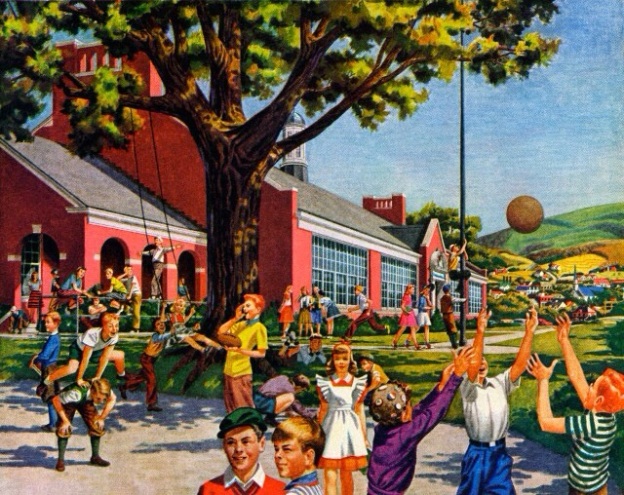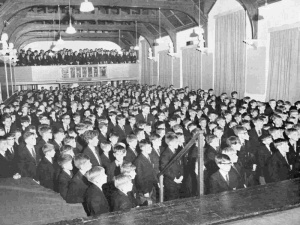I was lucky enough to go to a lovely village junior school. There were two playgrounds, one of which was a patchy Tarmac slope with a covered barn-like area at the top end, an extension of a beautiful old building. This covered area, I think housed some PE equipment, but I could have got that wrong. I seem to remember utilising an old vaulting horse as an impromptu stage under there. With a few of my friends we performed lunchtime concerts to the other children. These concerts (fifteen minute events) consisted of songs (Bananarama covers) from our new album (a C90 cassette). Whilst these ‘concerts’ went on, other playtime activities continued as normal, boys played football, girls plaited hair and teachers drank tea. The playground was a world in its own right. It was where historic battles were fought, intergalactic invasions thwarted and romances born, flourished and sadly expired. All the different factions within the school met together, exchanged ideas and settled disputes. Lessons were an unfortunate necessity, a background hum, that got in the way of these important gatherings.
Over recent weeks I have begun to reflect on the similarities between the congregation of pupils in the school playground and the interactions of tweeters on Twitter, particularly those within the educational Twitter community. There are such clear groups that exist within our playground. There are the naughty ones who play up all the time, pulling at the bunches of the pretty girls’ hair, calling them names and sometimes making them cry. The girls shout at them and tell them they are stupid. On Twitter the trolls fulfil this role, playing up to gain attention from everyone. Their behaviour usually works within the boundaries of their virtual playground. Jealousy and ignorance are a potent mix and behind the anonymity of a computer screen, people say things without thinking, forgetting that their fellow tweeters are human beings too. This kind of dehumanisation can also be seen in the actions of the playground bullies.
Playground politics were essentially all about which group you were in, the more popular your group, the more power you wielded and the higher your playground status. Take for example those people of high status. Maybe it was because they had an important role, perhaps they were form captains, milk monitors, or classroom prefects. You couldn’t touch these people, they were the pro’s. The rest of us would just look up to them in admiration. Unless you were in their inner circle they would just be seen from afar. You felt happy if a prefect asked you to move out of the way – suddenly your existence had meaning. Twitter has those top dogs too, in the educational sphere as well, quite often their importance marked by the elusive blue tick. You have been verified! You belong to the upper echelons of our Twitter society. The lowly amongst us sometimes timidly include their Twitter names in the hope that our existence too will be acknowledged – they read what I wrote! My words have meaning!
Not surprisingly there are obvious parallels between the existence of the in-crowd on Twitter and the ones in the playground. Those not in the cool-kids-clique are merely spectators on the outskirts of the exchanges that happen between these holy elite. I have wondered whether there was an equivalent of the Twitter no-no of retweeting praise. Did the in-crowd go around the playground telling everyone how great they were? Perhaps they did, and perhaps that’s why they still do it today. The cool kids of the playground are able to get everything right with, what appears to be, effortless ease. They had the best bags, the sharpest shoes, the coolest coats, not for them the cheapest cagoule from C&A. The really cool kids didn’t have to try to be cool, they just were. Of course this inner circle, both on Twitter and in the playground, generates another group, the wannabes, those that doggedly aspire to be part of that group. They cling on with gritty determination and huge amounts of effort. It makes me think of the months I took trying to persuade my mother that ‘donkey jackets’ were THE thing to wear and not the outfit of choice for dustmen. By the time I had tipped her over the edge into agreement the in-crowd were already pioneering a different fashion trend. Twitter has its effortless tweeters, those that are ahead of the news, making the news, setting the trends and then there are those who are trying to escape their perpetual struggle to do more than just retweet others.
Our choice of words is something that defines our experiences of playground life. The part of the country that I came from had its own language and terminology. I know, I’ve checked with others from other parts. For example, do you know what a ‘jitty‘ is? That time of life is also full of its own meaningful language, so it would be quite natural to chastise another by remarking that they were ‘in a right eggy Jeff‘. These words have the action of giving you an identity, you are part of the crowd, you belong. It is so obviously the case that this is true of Twitter, how some fellow tweeters might laugh should you not know the meaning of ‘twitosphere’. This is true too for the educational tweeters that not only sprinkle tweets with selections from the plethora of educational jargon, but add in a new layer of terminology uniquely formed from mixing education and social media. Language is about belonging, to shamelessly cherry pick from Wittgenstein, ‘don’t ask for the meaning, look for the use’. Twitter newbies, watch and learn, but most importantly get stuck in.
We have already seen there is an elite society built into Twitter, but there are even more ways that the Twitter community echoes the dynamic of the playground politics. Twitter is a world where you can actually nominate tweets to be favourites! It would take a strong, independent soul to deny that it’s rather nice to see that another person has favourited something you said. That moment of recognition has its equivalent in the playground. Can you remember that time when you went out on a limb to say something funny and the kids laughed or better still someone said, ‘that’s funny‘. Oh the sweet acknowledgement!
I’m a great fan of Twitter. I had been on Twitter for a while before I really saw the power that lay in its format. I think it was about the time of the London riots that I realised that Twitter was the best and quickest way to find out what was happening. Needless to say I’m not sure I was always the quickest in the playground to find out what was happening, but as a teacher and deputy, pupils used to wonder at how quickly I knew about the latest ‘news’. Of course, just as it is with the playground, there can be a great deal of misinformation on Twitter and discernment is needed in both arenas. Maybe you too, honestly followed the ‘Boston charity’ that appeared almost instantly after the marathon bombings promising to donate a dollar for every follow, that was quickly shown to be fake. It would be good to say there was more evidence of discernment on grown-up twitter, but recent examples of thoughtlessness, e.g. Tweeters in the public eye chastising Yorkshire schoolgirls, seems to show evidence to the contrary.
What light can this Twitter/playground analogy shed? I think there are lessons for us to learn, perhaps even from the mistakes of playgrounds past. Firstly, Twitter should be an open community and the range of ‘hashtag chats’ does suggest opportunities for sharing. In their schools, teachers genuinely want everyone to be able to be comfortable at break times and lunchtimes. We act swiftly to counteract any sense of intimidation and endeavour to stop bullying. It was not surprising, therefore, to see some teachers step in and challenge recent examples of trolling of school children. Beyond those obvious objections I think the playground might make us remember the outsiders. Those that don’t have a natural ease in the situation but want to be part of the community. It is possible to spot cliques emerging even within the educational Twitter community. There was always a fair bit of showing off in the playground and there certainly can be some of that on Twitter. With the wonderful gift of hindsight we can look back on playground memories and realise just how much we were all the same and at its best I think that this is something that Twitter can show too. Sure there will be private jokes, the in-crowd, the effortless cool kid, the wannabe, but 140 characters is actually a pretty good way to break down those boundaries as well as establish them. I learnt a lot about people, the world and life in general in the playground, I’m pleased the same is true for Twitter too.



